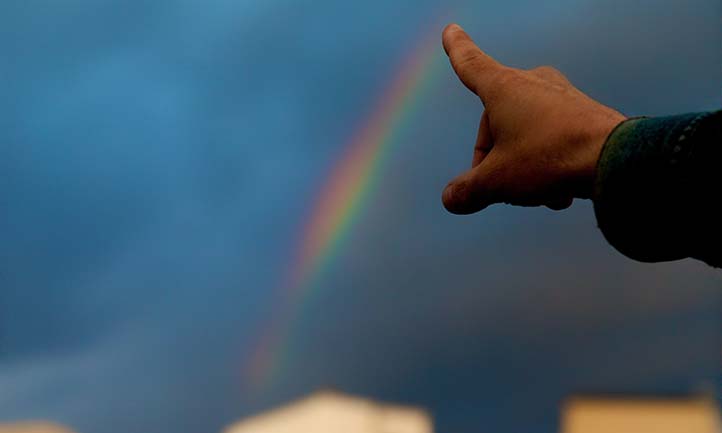The Power to Choose Hope
Author: Grace Seamon-Lahiff
On a recent morning, I did everything the work-from-home experts told me to do. I got up, changed clothes, brushed my teeth, combed my hair. I even put on a little makeup. I went about my routine: settling into the new normal, preparing myself for a day of spreadsheets. Listening to the news as I made my coffee. Allowing the details of this devastating pandemic to wash over me. Shielding myself in the embrace of avoidance and routine. Scoop the grinds, boil the water, pour the milk.
But then the news of the infected aircraft carrier infiltrated my shell of adapted normalcy. As a military brat and military spouse, it was too close to home.
I could no longer pretend that it was all okay. Not as the newscaster told me about the doctors they had flown in, not as he speculated about ventilator needs and the inability to contain the spread in close quarters. Not as I thought about all the repercussions the news rarely mentions: The loved ones waiting at home. Who, after months and months of waiting, were now going to have to wait another six months or more to hug on their service members. And then my mind, honed after so many deployments to prepare for the worst so I would never be disappointed, reminded me that the waiting is not the worst part of the separation. It is the isolation. It is the longing. It is the sleeplessness and the fear that they may never come home. It is the knowledge that death is a real possibility. Because in this life, it always is.
Right there in my kitchen, as my anxiety brain took over and the coffee went cold, I was reminded that the worst part of the truly devastating things in life is the helplessness. It is not the fear of the unknown or the anxiety of the other shoe; it is the feeling of being unable to stop the bad things from happening, especially when they are happening right before our eyes.
And just when the helplessness of this pandemic reaching the shores of my own life threatened anger and tears, the still small voice whispered: “There is another way”. There is.
 Photo: Paolo Chiabrando via Unsplash
Photo: Paolo Chiabrando via Unsplash
Don’t Give In to Helplessness
Countless times, sitting in a therapy room, I have guided my clients through the tenets of Acceptance and Commitment Therapy (ACT). Never failing to emphasize the model’s credo that while we cannot control or stop our thoughts and our emotions, we can control our response to them. We can control our behavior. According to ACT, because we cannot control our thoughts and emotions, we must decide what to do with them. We must do our best to enact behaviors that align with our core values. The goal of ACT then is to live a value-oriented life. To learn how to respond to life and our uncontrollable thoughts and emotions, instead of reacting to them.
I know all of this, but like anyone who has ever helped anyone else, I forgot my own advice when I myself was in need of guidance.
Shedding Light in Darkness
The truth is, I cannot stop the bad things from happening. Even when they are happening in front of me. I cannot stop this virus, I cannot stop death from coming. I cannot stop grief, or anxiety, or depression, or frustration, or anger, or even helplessness from showing up. But I can choose what I do with them. Tomorrow, I may choose to cry or to stamp my feet and shake my fists. But today I am choosing the other way: I am choosing to share. I am choosing to weaken the power of grief for what has and could be lost, by giving voice to my experience and shedding light on the dark places. I am choosing to write, and to reach out, and to remind myself and all of you, that even when the darkness comes, hope thrives in the knowledge that we will always have the power to choose how to weather the storm.
Today, I am choosing the other way. I am choosing to remember that I am never helpless because I can always choose hope.
Grace Seamon-Lahiff is a military brat, a military spouse, and a licensed Marriage and Family Therapist (LMFT). She is currently getting her PhD at Catholic University and works for TAPS as the manager for Research and Impact Assessment. Prior to coming to TAPS, she served as a mental health clinician for Marine Corps Community Services, providing therapy and creating preventative mental health programs.
